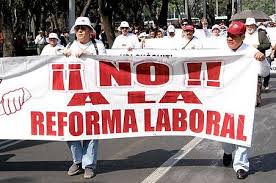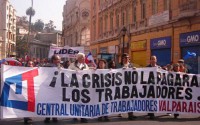México: Guadalajara, Jalisco/01/Mayo/2016/ Fuente: El Informador
Apenas tiene 13 años de edad, pero la niña Natalia Lizeth López López ya ha capturado las miradas de mucha gente. Su elocuencia y claridad al hablar resaltan en cuanto toma la palabra: desde su entorno como niña indígena comparte sus ideas concisas, críticas y que exigen una mejor sociedad para habitar. Orgullosa de sus raíces y preocupada por la niñez, Natalia se popularizó por un vídeo viral que registró un breve discurso que dio a sus 11 años, dentro de la entrega de premios del concurso Multiculturalismo en el Estado de Nuevo León, entidad en la que habita.
Sin saberlo en un comienzo, su video dio la vuelta a las redes sociales. Entonces estudiante de primaria, Natalia recibió ofrecimientos para apoyar sus estudios e invitaciones para dar conferencias. Ahora cursa la secundaria y pretende encausar su formación profesional en las leyes. Esta joven vocera de los derechos de los indígenas y de los niños llegó al Congreso de Jalisco para la actividad «Has escuchado a un niño», impulsada por la diputada María del Refugio Ruiz Moreno, en donde dio una charla y participó en sesiones grupales con niños de Jalisco. Pero, para conocer mejor sus propuestas y puntos de vista, platicamos con ella sobre los diversos temas que le interesan.
-¿Por qué te gustaría estudiar derecho?
-Todavía no lo tengo muy bien pensado, pero sí me gustaría ser licenciada en derecho. Es para defender, para hacer valer los derechos. Veo que casi no se respetan, que no se cumplen. Me gustaría hacer que se respeten.
-¿Qué tipo de discriminación te preocupa más?
-Todas son muy graves, pero lo que más me preocupa es que discriminen por ser indígenas. Si a alguien lo discriminan porque es de origen indígena ya no querrá seguir vistiéndose como se viste, ni hablar su lengua. Eso hace que se pierda la cultura de México.
-Tus padres provienen de culturas indígenas diferentes, ¿cuáles idiomas hablas?
-Mi mamá es de una comunidad en Veracruz donde se habla el náhuatl, ella lo sabe. Mi papá viene de Papantla, se habla el totonaco, pero a él no se lo enseñaron. Cuando nací, primero me enseñaron español; cuando fui creciendo me empezó a interesar (el náhuatl) y ahorita mi mamá me lo enseña.
-Vives en Nuevo León, ¿qué tan diferente es la situación ahí en comparación con lo que viviste en Veracruz?
-En nuestro pueblo discriminaban mucho. Hay un grave problema: los indígenas que se dedican a las ventas en el centro de Orizaba son maltratados, los golpean, dicen que no quieren que anden paseando por el centro porque hacemos que se vea fea la plaza principal. En Nuevo León se trata muy diferente, hay oportunidades de trabajo, se respetan sus derechos. En Veracruz estábamos en una zona rural, en Nuevo León vivimos en la ciudad.
-¿Qué opinas del acoso en las escuelas?
-Ahora en las escuelas está muy grave este problema y pocos se preocupan por resolverlo. Hay que encontrar una solución. Que los diputados, quienes aprueban los derechos y leyes, las hagan conforme a nuestras necesidades, a nuestro sentir. Las propuestas que expusimos son lo que nos hace falta o lo que garantice nuestro bienestar (a los niños).
-¿Qué te gusta más de la escuela?
En mi escuela hay diseño gráfico, danza, escolta, robótica, también enseñan francés. Son clubes donde nos enseñan una actividad extraescolar. Saliendo de la secundaria me voy a estudiar a una escuela de inglés donde me becaron. También puedo estudiar ahí por si quiero ser maestra de inglés. En mi tiempo libre leo o juego con mis hermanos.
-¿Qué consejo le das a tus hermanos y a otros niños?
-Que les guste estudiar, es por nuestro futuro, es la base de nuestra vida. También que alcen la voz, que no se queden callados si son víctimas de bullying, para que podamos encontrar una solución al problema.
-¿Cómo te sientes por la fama que tienes ahora, luego del vídeo de tu discurso?
-Primero, no sabía que mi vídeo se había hecho viral. Un mes después empezaron a llegar muchas personas: de radio, de periódicos, de televisión. Me querían entrevistar pero yo no sabía por qué. Hasta que mi directora me dijo que mi vídeo en el que decía el discurso se hizo viral. Querían que diera pláticas a los colegios, a las primarias. Fue un cambio en la vida, en la cuestión de que cuando me ven, me reconocen o me invitan de otras ciudades.
-¿Te gusta ser vocera de las causas que cuidas?
-Sí, yo en especial alzo la voz por los niños, que regularmente casi no somos escuchados. Por eso me gustó este evento, «Has escuchado a un niño». También por los indígenas, que casi no los toman en cuenta, son muy discriminados. Por eso acepté hablar frente a la gente, para hacer ver el problema y para cambiar la situación. MÉXICO: Niños en pie de lucha
Con Información de El Informador
Fuente de la noticia: http://www.entornointeligente.com/articulo/8328119/MEXICO-Nintilde;os-en-pie-de-lucha-01052016
Imagen: http://img.informador.com.mx/biblioteca/imagen/242×323/1305/1304618.jpg




















 Users Today : 36
Users Today : 36 Total Users : 35460167
Total Users : 35460167 Views Today : 53
Views Today : 53 Total views : 3418836
Total views : 3418836